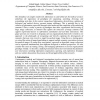Free Online Productivity Tools
i2Speak
i2Symbol
i2OCR
iTex2Img
iWeb2Print
iWeb2Shot
i2Type
iPdf2Split
iPdf2Merge
i2Bopomofo
i2Arabic
i2Style
i2Image
i2PDF
iLatex2Rtf
Sci2ools
CBMS
2007
IEEE
2007
IEEE
Multifaceted Hyperimage-Based Organization and Interaction with Bio-Medical Images
The abundance of complex media-rich information in state-of-the-art bio-medical sciences underlines the importance of paradigms for organizing, searching, browsing, and assimilating such data. In this context, image-based information, derived from a plethora of biological and medical devices, presents unique challenges. This is partially due to the richness of information expressible through visual media and the complexity of the underlying semantics. There is today a paucity of paradigms that allow organization and browsing of large image collections, in manners that capture the intricacies of image semantics and support experiential factors in information assimilation and user-data interactions. This paper presents our research in designing such an organizational framework. Central to our approach is the philosophy of recognizing and directly capturing the heterogeneity of semantics that may exist even for a single bio-medical image. Using this as a starting point, we extend the not...
Bio-medical Images | CBMS 2007 | Image Collections | Medical Imaging | State-of-the-art Bio-medical Sciences |
| Added | 02 Jun 2010 |
| Updated | 02 Jun 2010 |
| Type | Conference |
| Year | 2007 |
| Where | CBMS |
| Authors | Rahul Singh, Pierre-Yves Corlobe |
Comments (0)

